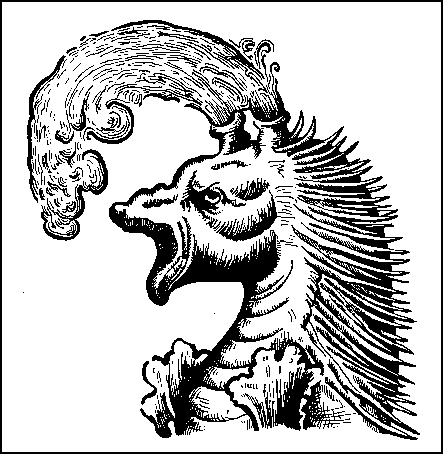From an
Angry Cayman

The Ichthyologist, after the nasty manner of scientists, wanted to examine the stomach contents of one of them. He suspected them of eating his fish out of his gill-nets at night and of tearing great pieces of the net out with them. So I shot him one. No such monster as those I have just mentioned, but plenty big enough. It duly churned up the water with its great tail and then floated, still, on its side. The dead cayman, for all that one may have read, doesn't float belly up, the very simple reason being that the tail is jointed only for lateral movement, and hangs, therefore, limp on one side or the other, turning the body accordingly.
Well, I took a rawhide lariat and swam out and towed the beast in. There, was no danger in this, because the rest of the cunning brutes are, so suspicious; that after a disturbance like that they will lie doggo on the bottom for a long time. Together we hauled the creature high and dry and then went back to camp to bring photographic materials. And when we came back ten minutes later the dead cayman had turned round and gone home again. It was then that I had a qualm.
But that isn't the charming story. The story is about egg. An Indian told us that he knew where there was a cayman nest, some distance round the shore. So the R. M., Young America, and I hitched up a bull-cart and went off to photograph it. It was a mound of dead leaves and rotting vegetation about three feet high, in the steaming center of which lay the eggs, incubating in neat rows. I had cut a few sapling poles out of the way so as to get a good set-up for my motion-picture camera, when there was a grunting bellow and a rush and Ma Cayman came charging out of the reeds to see who was rifling her nest. Young America snatched up a pole and shoved it all the way down the beast's gaping throat, which fetched a hoarse croak from it and the cayman backed off and scuttered away into the water.
I was busy shooting my picture when the brute charged again. Young America nervily kept fending her off with the pole, yelling to me the while to crank some "good action stuff." Unfortunately Ma was no trained performer. Wherever she fought, there were always twigs and leaves intervening before the lens.
However, even that isn't the story. I mention the incident as an example of how bold that otherwise wariest of reptiles may sometimes be. The story is about the eggs. Ma became discouraged after a particularly deep taste of stick, and retired into the water for good. Then we decided to take home the eggs and see if we could incubate them out in a garbage-pile somewhere nearer home. The question was, in what were we to carry them?
There were forty-nine of them, elongated things about three inches in length and one and a half wide, with a peculiarly fragile white-porcelain looking shell. The only possible receptacle were the R. M.'s high rubber boots. That Southern gentleman is very neat and particular about his appearance and loathes to go sloshing about in lakeside muck if he doesn't have to. Hence the tall felt-lined rubber waders. He hated to give them up. But "for the sake of science" we overruled him, tenderly filled up his footgear with cayman eggs, and started home in our bull-cart, Young America and I carefully nursing a boot each to protect it from the bumps incidental to such travel.
So anxiously did the R. M. keep adjuring us to be careful with his precious boots that we were within sight of camp before the catastrophe occurred. The bulls spied a snake of some sort in the path. Immediately they snorted with affright and went careening off at a tangent, quite out of control, Even so all might have been well; but one bull, unable to sheer his yoke companion off, had to leap an ant-hill. Slam! went the wheel against it, and heaved itself over the top of the unyielding mound. The cart careened over, teetered along on one wheel for a moment, and then turned. We were thrown clear without any damage other than a shaking and a few scratches as we rolled in the spiky grass. But wae's me for the twin felt-lined rubber boots full of cayman eggs! In one fell swoop our scientific experiment was reduced to shambled eggs.
I should add, in order that the charm of this little story may be appreciated to the full, that cayman eggs are not as other honest eggs, of healthy yoke and white, but contain a curious mélange of the primal slime which smells sickishly of fish and musk and which just won't wash out. The R. M. is very angry with us, the more so since the Botanist hasn't stopped laughing about it yet. Neither have we, for that matter. But as a handsome compensation, I have spent hours by the lake shore composing for the R. M. a lament of singularly plaintive beauty, on the bagpipe, entitled "The Coronach of the Cayman Egg."
Gordon MacCreagh